“Prepare Ye the Way of the Lord”
Matthew 3–4; John 1:35–51
LDS manual: here
Reading
For this reading, Jesus is getting started on his ministry. He’s about 30 years old, which means that for the last 18 years, he’s been doing things that Christians have tried hard to hush up. (Mormons aren’t the only ones who can sanitise a history, you know.)
This lesson covers the following:
- Baptism of Jesus
- The temptation of Jesus
- The marriage at Cana
- Driving the money-changers from the tample
Main ideas for this lesson
John the Baptist
John the Baptist is a prophet from the Old Testament tradition. Those guys were great. They’d get naked and prophesy, they’d cook bread on a fire made from their own dung. John would have fit right in; he wears hairy clothes, and eats locusts and honey.
So John baptises Jesus, and then God speaks from heaven, and the Holy Ghost comes down in Bird Mode.
Matt. 3:16 And Jesus, when he was baptized, went up straightway out of the water: and, lo, the heavens were opened unto him, and he saw the Spirit of God descending like a dove, and lighting upon him:
3:17 And lo a voice from heaven, saying, This is my beloved Son, in whom I am well pleased.
But Jesus is not unique in that regard. The same thing happened to Robert Plant. God was a huge Zep fan back in the day.
Little known fact: Space Moose was also there.
(Disclaimer: No one should read Space Moose comics. They are terribly offensive and weird.)
This experience seems to have made quite an impression on John,
John 1:36 And looking upon Jesus as he walked, he saith, Behold the Lamb of God!
but later on when he’s in prison, he doesn’t seem so sure. He sends a couple of his disciples to ask Jesus if he really is the Lamb of God.
Matt. 11:2 Now when John had heard in the prison the works of Christ, he sent two of his disciples,
11:3 And said unto him, Art thou he that should come, or do we look for another?
I’ve heard people explain this away by saying that John knew Jesus was the Messiah, but he wanted his disciples to meet Jesus in person. That’s a bit silly; lots of people met Jesus, and not everyone was into him. Actually, people went hot and cold on Jesus in amazingly short periods of time, depending on where in the story we are. But more on that later.
Temptation
There’s something interesting here: Satan, who hasn’t been seen since Job, is back, and he’s here to tempt Jesus three times, for a few minutes. This is in contrast to the rest of us, who Satan is apparently working on more or less full time.
There’s a contradiction in the two versions of this story. Notice the verse numbers. The two parts of the story are flipped.
| Matthew 4:5–10 | Luke 4:5–12 | |
|---|---|---|
| Satan takes Jesus to the top of the temple | 4:5 Then the devil taketh him up into the holy city, and setteth him on a pinnacle of the temple, 4:6 And saith unto him, If thou be the Son of God, cast thyself down: for it is written, He shall give his angels charge concerning thee: and in their hands they shall bear thee up, lest at any time thou dash thy foot against a stone. 4:7 Jesus said unto him, It is written again, Thou shalt not tempt the Lord thy God. |
4:9 And he brought him to Jerusalem, and set him on a pinnacle of the temple, and said unto him, If thou be the Son of God, cast thyself down from hence: 4:10 For it is written, He shall give his angels charge over thee, to keep thee: 4:11 And in their hands they shall bear thee up, lest at any time thou dash thy foot against a stone. 4:12 And Jesus answering said unto him, It is said, Thou shalt not tempt the Lord thy God. |
| Satan takes Jesus to the top of the mountain | 4:8 Again, the devil taketh him up into an exceeding high mountain, and sheweth him all the kingdoms of the world, and the glory of them; 4:9 And saith unto him, All these things will I give thee, if thou wilt fall down and worship me. 4:10 Then saith Jesus unto him, Get thee hence, Satan: for it is written, Thou shalt worship the Lord thy God, and him only shalt thou serve. |
4:5 And the devil, taking him up into an high mountain, shewed unto him all the kingdoms of the world in a moment of time. 4:6 And the devil said unto him, All this power will I give thee, and the glory of them: for that is delivered unto me; and to whomsoever I will I give it. 4:7 If thou therefore wilt worship me, all shall be thine. |
The supposed existence of Satan in the world is a bit of a puzzle. What in the world is Satan doing roaming about? As parents, we try as hard as we can to reduce our children’s exposure to harm. God’s just the opposite; he’s like, “Go for it, Satan!”
Why is God allowing this? Apparently it’s so that we can have agency. He is truly a kind and wise creator.
Actually, Satan isn’t all bad. He was really just trying to help.
Turning water into wine
At a wedding in Cana — plot twist: apostle Orson Hyde taught that the wedding was Jesus’ own! — Jesus performs his first conjuring trick / miracle: turning water into wine. That’s kind of an old one. Dionysus was supposed to have done it, and devotees of Sai Baba say he once turned water into petrol. (One would suppose that with that power, it might be incumbent on one to solve problems related to the world energy supply, but I digress.)
Wine: Was it just grape juice?
With the Mormon prohibition on alcohol, members have a hard time accepting that Jesus drank wine. Some go so far as to insist that the ‘wine’ Jesus drank at various periods was nothing but non-alcoholic grape juice.
I remember this bit from a terrible book called Day of Defense (PDF), which was handed around my mission, and was my introduction to proof-texting and quote-mining. Such legalistic line-by-line cherry-picking — done not to find out what’s true, but solely to establish one’s own pre-conceived view — is the stock in trade for so much apologetics. It was this approach that helped me to see that religious reasoning was not an honest way of getting answers to questions, for which I’m very grateful.
Here’s what Day of Defense says about wine:
The wine used in the Lord’s Supper was nothing more than grape juice, or as the scriptures stated it “fruit of the vine”.
Womp womp. As discussed in this Reddit thread, grape juice starts to ferment almost immediately, and it wasn’t until 1869 that Thomas Welch figured out how to pasteurise grape juice to stop the fermentation. Unfermented grape juice wouldn’t have been possible in Jesus’ day.
Anyway, the Bible has people calling Jesus a ‘wine-bibber‘, which seems unlikely in the absence of wine.
Activity for readers stuck in a real Gospel Doctrine class: See if anyone tries the ‘grape juice gambit’. Do they resist the facts when you point them out? Put your experiences in comments!
Flipping tables in the temple
I always liked the story of Jesus driving out the money-changers.
John 2:13 And the Jews’ passover was at hand, and Jesus went up to Jerusalem.
2:14 And found in the temple those that sold oxen and sheep and doves, and the changers of money sitting:
2:15 And when he had made a scourge of small cords, he drove them all out of the temple, and the sheep, and the oxen; and poured out the changers’ money, and overthrew the tables;
2:16 And said unto them that sold doves, Take these things hence; make not my Father’s house an house of merchandise.
It puts a new spin on an old acronym. Who would Jesus lash?
On the other hand, it doesn’t make him much of a “job creator“.
Additional lesson ideas
40 days and 40 nights = Hebrew idiom for “a long time”?
There are a lot of examples of things happening for “40 days and 40 nights”, including the Flood and the starvation of Jesus. The repeated appearance of this number, combined with the fact that it’s not really possible to survive 40 days without water, has made people suppose that “40 days and 40 nights” is some kind of idiom for “a long time”. I haven’t found anything conclusive, although some writers agree.
At a late stage in my deconversion, I was talking to one of the counsellors in the Stake Presidency — a good guy, BTW — and he told me that he thought it was just an idiom. I must have assumed that everyone was as literal-minded about the scriptures as I was, because this came as kind of a surprise to me.
“Doesn’t this weaken the claims of the Bible for you?” I asked.
“The Holy Ghost tells me what to believe,” he replied.
Partial credit to him, I guess, for moderating the amount of nonsense he was willing to swallow, but it seemed to me — both then and now — that if one is willing to take this view, it makes the job of understanding the scriptures well-nigh impossible. Everyone can have their own view because every every every detail can be understood multiple ways. God is the author of confusion.
Jesus abuses his mum
Jesus has this bad habit of giving his mother some sass. Here he is at the wedding of Cana.
John 2:3 And when they wanted wine, the mother of Jesus saith unto him, They have no wine.
2:4 Jesus saith unto her, Woman, what have I to do with thee? mine hour is not yet come.
Joseph Smith tries to save the situation, unconvincingly.
“What wilt thou have me do for thee? that will I do” (Joseph Smith Translation, John 2:4)
The LDS manual has this under the heading: “Jesus shows respect and love for his mother”. Way to turn it around, chaps. But no, Jesus is being kind of a dick again.








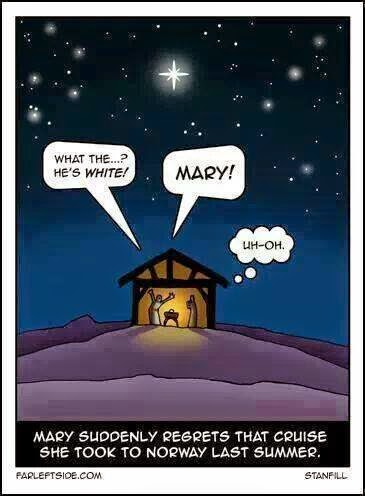




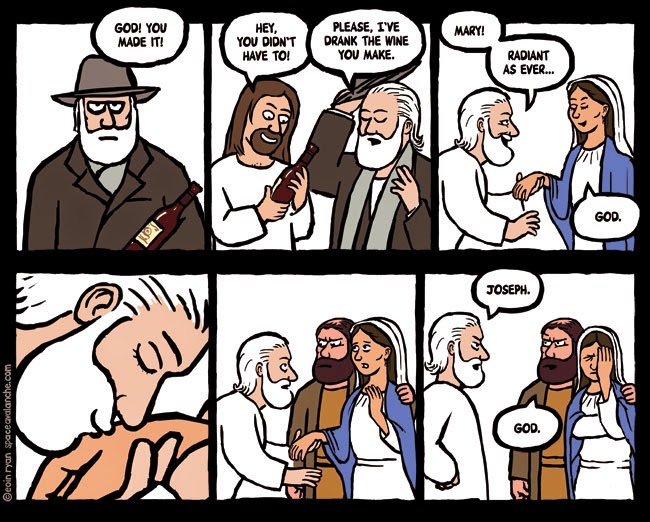








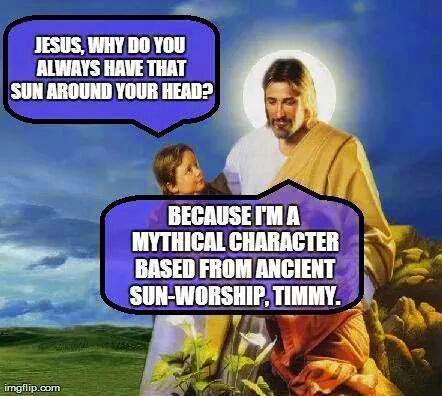
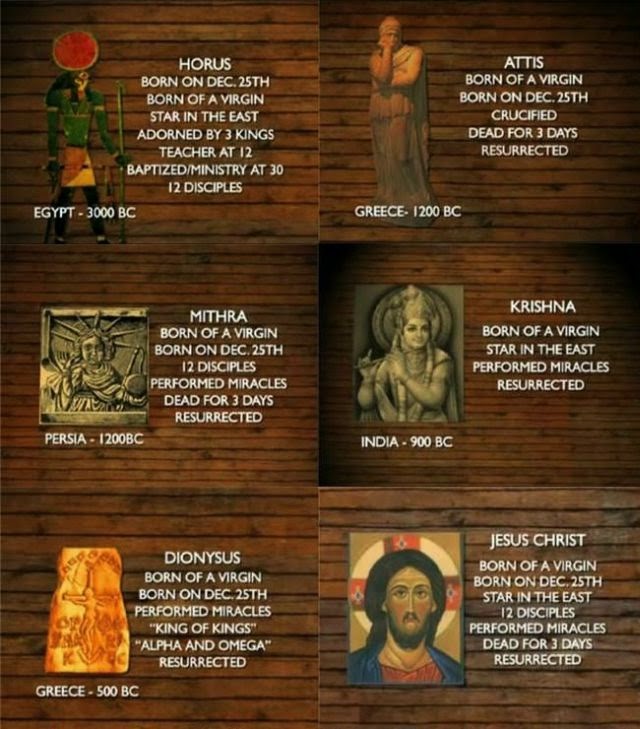
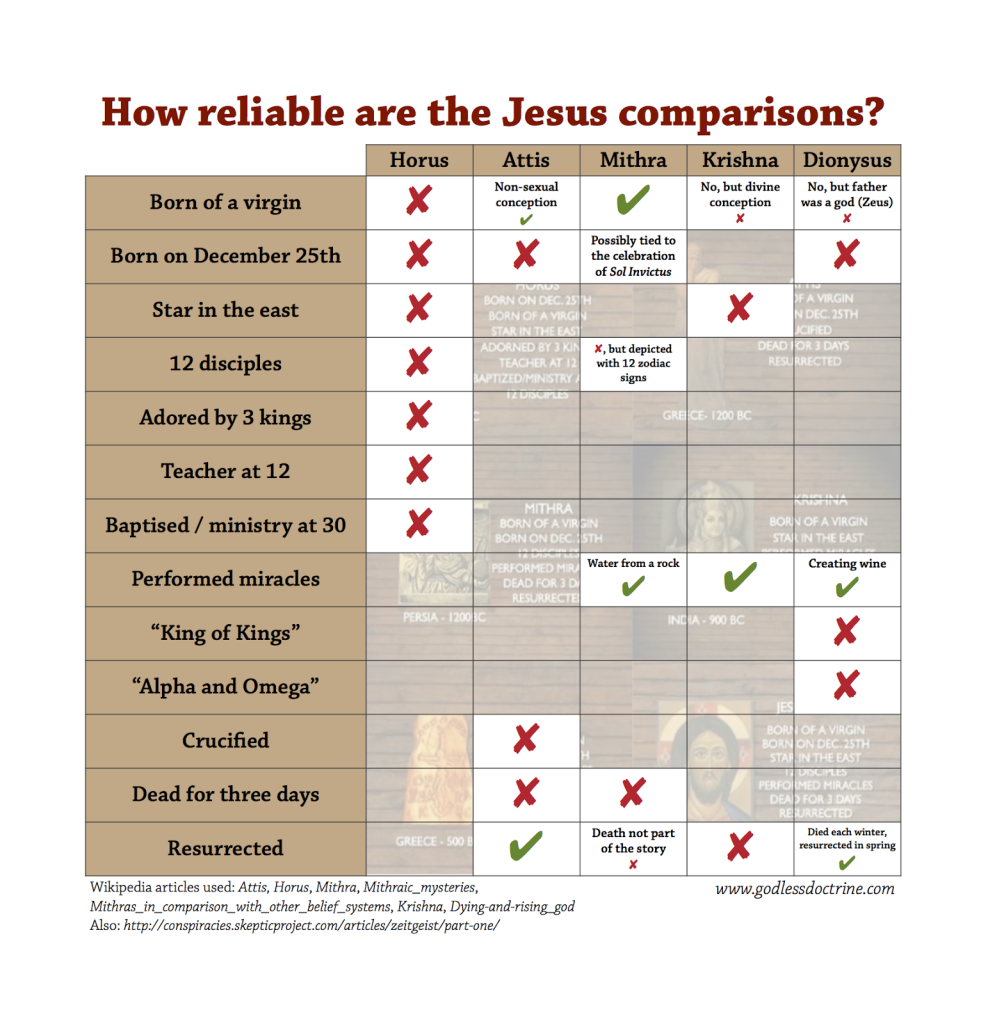




Recent Comments